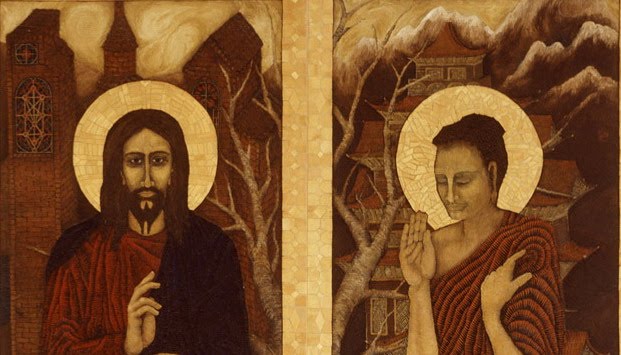A core function of the human mind is dreaming, or imagining events that haven’t actually taken place. This can occur while sleeping, while bored during the day, while exercising, pretty much any time when your attention is free, this is possible for the mind. If you are intensely focused on something, for instance your breath, then the mind cannot create these abstractions or false realities. This is part of the Maya that Buddhists and Hindus believe is the illusion of this world.
I’ve heard a lot about spirituality in the last 3 months; I’ve heard that the Buddhas enlightenment meditation was about 4 hours long, I’ve learned that the mind will ceaselessly process events for seemingly no reason, I’ve learned that Buddhism is absolutely a religion, and I have come to the conclusion that the Western and Eastern spiritual religions are two sides of the same coin; the quest for power.
The Buddha and Jesus Christ are treated very similarly in their respective religions of Buddhism and Christianity. Each is somewhat of a key holder to salvation from the world; the Buddha through enlightenment, and Jesus through heaven. Being educated by Jesuit priests has its advantages; I believe it is a requirement to have a PHD in both Theology and Philosophy. Eight years at Jesuit schools has taught me a lot about how to understand and interpret mythology, which religion can effectively be compartmentalized under.
Proper understanding of any literature requires analysis of three major factors : historical events, cultural rituals, and most importantly language. It is impossible to understand what writers were attempting to say in ancient times without understanding their lifestyle, educational background, and historical circumstances. These three things cross over into each other (ie language is a cultural phenomenon and history consists of many important rituals and customs), so having a decent understanding of all three circumstances is important to understand the meaning of what is being said.
If we look at most modern-day christianity, a lot of this contextual information is forgotten, therefore disregarded which causes us to completely lose the meaning of the original text. You need this contextual information to understand what the author is trying to express.
A lot of people don’t understand the bible but quote it regularly; I hesitate to say most, but I don’t think I would be wrong. It is an ancient book written for ancient times and most of it was passed orally before it was ever written, including all four books about Jesus’ life. Even with all of the available knowledge regarding historical, cultural, and linguistic circumstances, we still have a very small picture into the life of someone like Jesus. So we idealize about the individual person in nearly every way, because we allow our brains to construct “the perfect” human. This is essentially what the ideal of Jesus epitomizes in Christianity, an individual that sacrifices everything for his community, even though he receives no recognition for it.
The buddha is very similar to eastern traditions. A lot of the knowledge passed from the Buddha was also passed down orally; but instead of the 70-100 years gap before Jesus’ teachings were written, the Buddha’s teaching were first written about 400 years after he died. This leaves a rather large margin for misinterpretation in the writings of both holy books. He was also a “perfected” human, though his path was different he achieved enlightenment and unison with the divine.
Most scholars accept that the Buddha lived and founded a monastic order and that he was a younger contemporary of Mahavira (the Jain teacher). But very few are hesitant to say much more than this, because of the convoluted theologically influences historical events. The same is true with Jesus, most scholars accept that he lived, died, and founded an order in the process. But scholars of both traditions believe that the traditional texts are not at all historically reliable.
Both the Buddha and Jesus led tremendous cultural revolutions that were anti-establishment; Jesus against rabbis and Jewish pharisees, and the Buddha against Hindu ascetics and Brahmins that constructed the caste system. Both taught about freedom that can’t be obtained externally and both were very misunderstood then, and now. And both were lost to time, never to be truly understood because of lack of reliable information. This has created a complete idealization of both figures, so much so that individuals consider them to be the gateways to the divine.
Why am I writing about this? To exemplify a constructive process of the mind, called idealization. We do this with people we look up to, idolizing and making up idealistic personalities for them. Modern music, movies, acting, etc creates plenty of this. It is part of how we dream, we look up to the individuals we think of as the most successful, or the highest quality. Then we try to be more like them to improve our functioning within society.
We need to step away from these ideals and understood the people around us as humans, rather than idealizing about your favorite artist, a model whose body is unforgettable when photo shopped. Jesus and the Buddha were both humans. There really isn’t any evidence to show otherwise, so that is my position that I am sticking to, because instead of creating an impossible ideal to strive towards, now you have a concrete human that you can measure your own progress against.
Being anti-establishment is important; it’s what allows the establishment to grow and evolve to better fit the needs of the unfortunate underprivileged. Both leaders were completely anti-establishment, in my opinion. They were leading revolutions. Remember that the next time you go to church, or a temple. Jesus literally taught against established religion. I don’t remember Jesus ever going to church, nor the buddha building a temple where he wanted to meditate. The Buddha was enlightened under a tree! And both were focused on being and existence and you can tell because they didn’t write anything about themselves! They were busy teaching people how to stop thinking about how virtue can make you happy. So focus on being happy now, like these awesome dudes!

